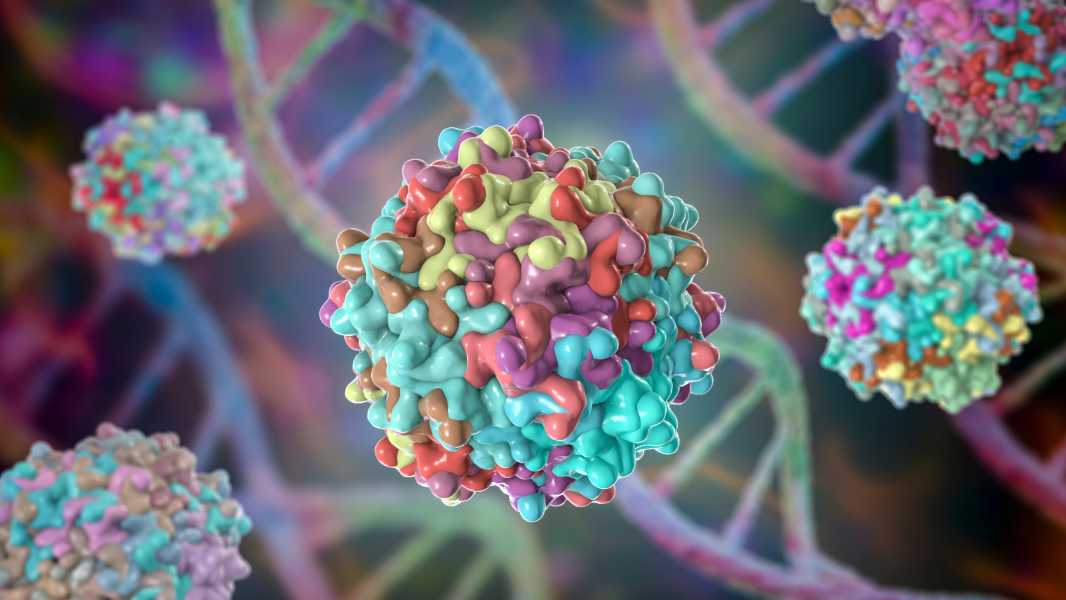
This gene therapy involves introducing a genetically modified virus (pictured above) into the brain to stimulate the production of dopamine, which is low in people suffering from alcohol addiction.
A new study in primates suggests that a novel gene therapy that “resets” the brain's reward system could help treat alcohol use disorder.
The study found that in monkeys predisposed to excessive alcohol consumption, a surgical injection of gene therapy into the brain increased production of the so-called happiness hormone dopamine. This, in turn, significantly reduced alcohol consumption in the primates, an effect that lasted for a year.
If the therapy proves safe and effective in people, it could become a “one-time” treatment for alcohol use disorder (AUD), a medical condition in which patients are unable to stop or control their drinking despite its negative impact on their daily lives. Excessive alcohol use causes 140,000 deaths in the U.S. each year, and although AUD is one of the most common mental health disorders, the U.S. Food and Drug Administration (FDA) has approved only three drugs to treat it.
However, none of them are aimed directly at the deep changes in the brain that occur with long-term alcohol consumption.
Alcohol increases the production of dopamine in the brain, which causes feelings of relaxation and improved mood. However, with AUD, the brain adapts by producing less dopamine, meaning people need more alcohol to achieve the same positive effects.
The same thing happens in monkeys that abuse alcohol, even during periods when they're not drinking, lead study author Kathleen Grant, a professor of behavioral neuroscience at Oregon Health & Science University, told Live Science.
In a new study published Monday (August 14) in the journal Nature Medicine, Grant’s team injected a genetically modified virus into the ventral tegmental area — a part of the brain responsible for processing reward — of four monkeys during a surgical procedure. The monkeys had access to steadily increasing amounts of ethanol dissolved in water over several months, to the point that their consumption levels mimicked chronic heavy drinking in humans.
Using a similar approach to that used to treat Parkinson’s disease and a rare genetic disorder known as aromatic L-amino acid decarboxylase deficiency, the harmless virus carried a gene encoding a protein called glial cell-derived neurotrophic factor (GDNF), which helps maintain and repair neurons. By introducing the GDNF gene into dopamine-producing cells, the team reasoned that this would prompt them to produce normal levels of the chemical.
The monkeys reduced their alcohol consumption by more than 90% compared to the control group, and their dopamine levels returned to “normal levels” for at least a year after treatment, roughly equivalent to nine to 12 years in humans, Grant said. Because relapse is “an integral part of the cycle” of AUD, returning to the levels the animals were seeing before they started abusing is critical, she said.
Andrew McQuillin, a professor of molecular psychiatry at University College London who was not involved in the study, told Live Science via email that the long-term side effects of the treatment are not yet clear. While brain surgery is “generally well tolerated” by people, he noted that it “appears to be a somewhat invasive approach for all but the most severe cases of alcohol use disorder.”
Grant also cautioned against overgeneralizing the findings. “This is just proof of principle that you can reverse this behavior in people with alcohol use disorder that is resistant to all other treatments,” she said. “It would not be your first line of treatment, [it] would only be appropriate in very severe cases of alcohol use disorder.”
McQuillin added that further research will be needed to test the suitability of this treatment for substance use disorders. However, the findings may open up new perspectives for other options.
Sourse: www.livescience.com





